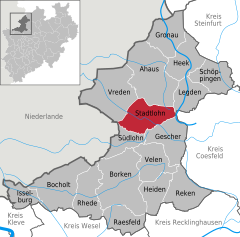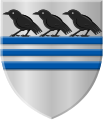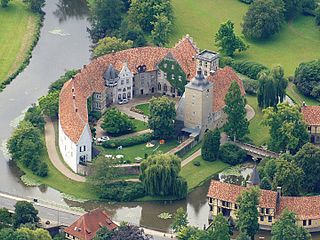
Steinfurt is a city in North Rhine-Westphalia, Germany. It is the capital of the district of Steinfurt. From c. 1100–1806, it was the capital of the County of Steinfurt.

Coesfeld is a Kreis (district) in the northwestern part of North Rhine-Westphalia, Germany, west of the city of Münster. Neighboring districts are Steinfurt, district-free Münster, Warendorf, district-free Hamm, Unna, Recklinghausen, Borken.

Metelen is a municipality in North Rhine-Westphalia, Germany. It is located on the river Vechte in the district of Steinfurt. Metelen Land station is located on the Münster–Enschede railway and has an hourly train service to Münster in one direction and to Enschede in the other direction.

Wesel is a city in North Rhine-Westphalia, Germany. It is the capital of the Wesel district.

Willich is a town in the district of Viersen, in North Rhine-Westphalia, Germany. It is 20 km west of Düsseldorf, 14 km north of Mönchengladbach, 10 km south of Krefeld, about 30 kilometres east of the border with the Netherlands and 45 km east of Roermond.

Bocholt is a city in the north-west of North Rhine-Westphalia, Germany, part of the district Borken. It is situated 4 km south of the border with the Netherlands. Suderwick is part of Bocholt and is situated at the border annex to Dinxperlo.

Eschweiler is a municipality in the district of Aachen in North Rhine-Westphalia in Germany on the river Inde, near the German-Belgian-Dutch border, and about 15 kilometres (9 mi) east of Aachen and 50 kilometres (31 mi) west of Cologne.
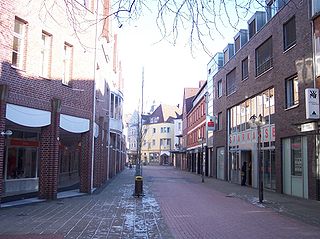
Coesfeld is the capital of the district of Coesfeld in the German state of North Rhine-Westphalia.

Kevelaer is a town in the district of Kleve, in North Rhine-Westphalia in Germany. It is the largest Catholic pilgrimage location within north-western Europe. Over one million Marian devotees, mostly from Germany and the Netherlands, visit the Basilica of Kevelaer every year to honour the Blessed Virgin Mary. The population in 2019 was 28,021.

Dülmen is a town in the district of Coesfeld, North Rhine-Westphalia, Germany.

Werne an der Lippe is a town in the Federal state of North Rhine-Westphalia in the Unna district in Germany. It is located on the southern edge of the Münsterland region near the Ruhrgebiet. The population of Werne is about 32,000.

Telgte is a town in the Warendorf district, North Rhine-Westphalia, Germany, on the river Ems 12 km east of Münster and 15 km west of Warendorf. Telgte is famous as a place of pilgrimage, the Marian pilgrimage from Osnabrück to Telgte.

Ahlen is a town in North Rhine-Westphalia, Germany, 30 km southeast of Münster. Ahlen is part of the District of Warendorf and is economically the most important town in that district. Ahlen is part of the larger Münster region, and of the historic Münsterland area. The nearby villages of Dolberg, Vorhelm and Tönnishäuschen are part of Ahlen, as well. The largest neighboring town is the city of Hamm to the southwest.

Wettringen is a village and a municipality in the district of Steinfurt, in North Rhine-Westphalia, Germany.
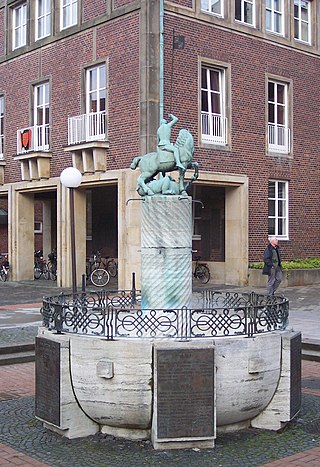
Ahaus is a town in the district of Borken in the state of North Rhine-Westphalia, Germany. It is located near the border with the Netherlands, lying some 20 km south-east of Enschede and 15 km south from Gronau. Ahaus is the location of one of Germany's interim storage facilities for radioactive spent fuel.

Gescher is a municipality in the district of Borken, in North Rhine-Westphalia, Germany. It is located near the border with the Netherlands. It is most often known for its bell work, and it includes a Museum of Bells.

Rees is a town in the district of Kleve in the state of North Rhine-Westphalia, Germany. It is located on the right bank of the Rhine, approximately 20 km east of Kleve. The population in 2005 was 22,559. Founded in 1228, Rees is the oldest town in the lower Rhine area.

Nordwalde is a municipality in the district of Steinfurt, in North Rhine-Westphalia, Germany.

Selm is a town in the district of Unna, in North Rhine-Westphalia, Germany. It is situated approximately 20 kilometers north of Dortmund and 25 kilometers west of Hamm.

Beckum is a town in the northern part of North Rhine-Westphalia, Germany. It is about 20 km north-east of Hamm and 35 km south-east of Münster. It gives its name to the nearby Beckum Hills.

